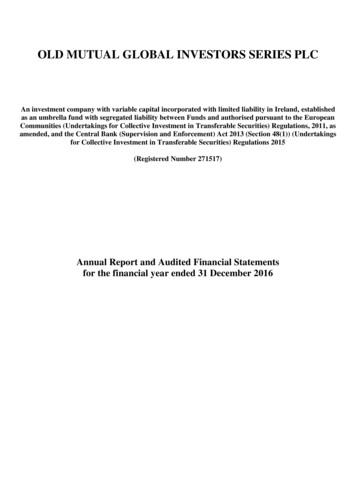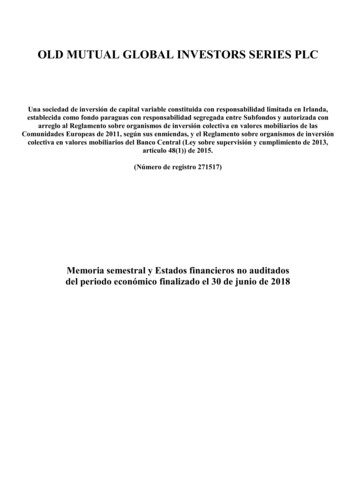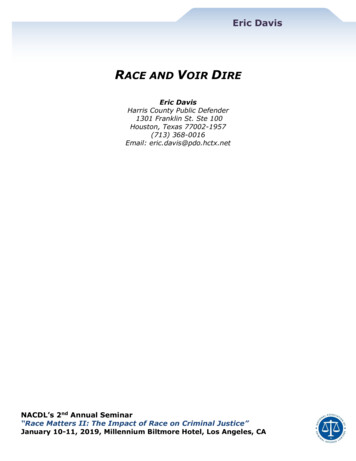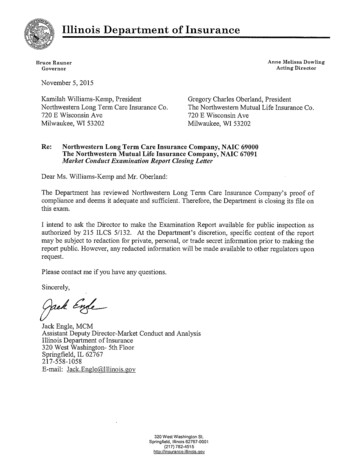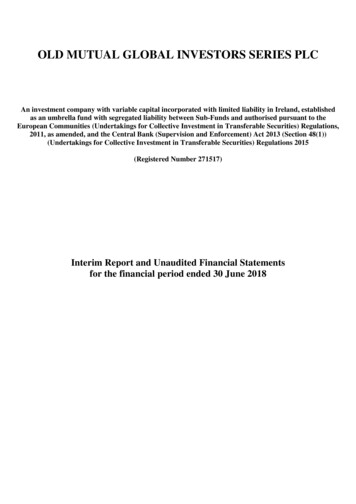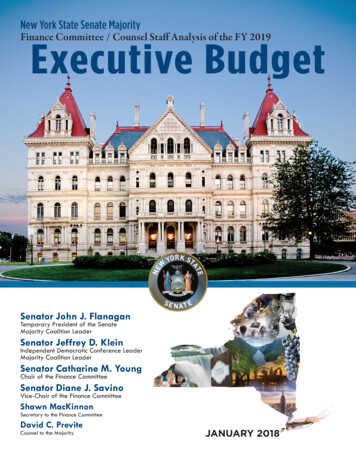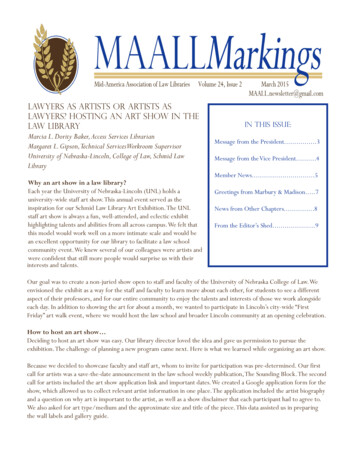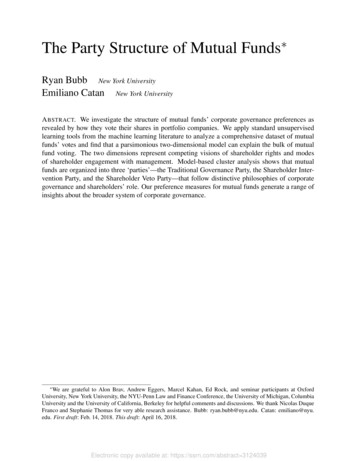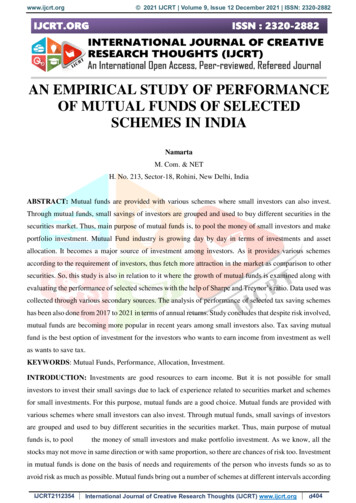
Transcription
of counselagreementsRisk Management practiceguide of Lawyers MutualLAWYERSMUTUALLIABILITY INSURANCECOMPANY OFNORTH CAROLINAwww.lawyersmutualnc.com
Of Counsel AgreementsRisk Management Practice Guides of Lawyers MutualLawyers often use the “of counsel” designation loosely and inappropriately.One must observe the ethical rules and should observe practical precautions when forming “of counsel”relationships and working in such a relationship. Doing so protects the “of counsel” lawyer and the law firm towhich he is associated from grievances and liability claims.How to Use this GuideThis Lawyers Mutual Practical Guide will help you navigate the pitfalls of forming and working in an “of counsel”relationship with another lawyer or law firm. We will provide rules, risk management pointers and sampleagreements.This Guide offers general information that should benefit most lawyers. It is not intended as legal advice oropinion, nor does not purport to establish a specific standard of care for you or your law firm.For more information – or if you have additional questions – please contact Lawyers Mutual’s Client ServicesTeam.
Table of ContentsWhat Are The Ethical Requirements Of An“Of Counsel” Relationship?2What Are The Ethical Pitfalls Of An“Of Counsel” Relationship?4What Are The Malpractice Risks Of An“Of Counsel” Relationship?5What Are Some Practice Pointers To ObserveWhen Forming An “Of Counsel” Relationship?5Checklist for Planning the Of Counsel Agreement6Sample “Of Counsel” AgreementsOf Counsel Agreement – IndependentContractor and Partnership7Of Counsel Agreement – IndependentContractor and Partnership (alternate language)9Of Counsel Agreement – IndependentContractor and Professional Service Corporation12Of Counsel Agreement – Retiring Partner15Of Counsel Agreement – Potential Partner17Disclaimer: This document is written for general information only. It presents some considerations that might be helpful in your practice. It is not intended as legaladvice or opinion. It is not intended to establish a standard of care for the practice of law. There is no guarantee that following these guidelines will eliminate mistakes. Lawoffices have different needs and requirements. Individual cases demand individual treatment. Due diligence, reasonableness and discretion are always necessary. Sound riskmanagement is encouraged in all aspects of practice.march 2017
What are the ethical requirements of an “of counsel” relationship?In North Carolina, we have two ethics opinionsdiscussing use of the designation “Of Counsel.”The last sentence of RPC 85 reads: “Any pertinentjurisdictional limitations on the lawyer’s entitlement topractice must also be indicated.”RPC 34 (1988)Even though RPC 85 does not explicitly overule RPC34, it is apparently no longer necessary that an “ofcounsel” lawyer be licensed in North Carolina. Alawyer licensed in another state can be “of counsel”to a North Carolina lawyer as long as the otherrequirements of RPC 34 and RPC 85 are met.RPC 34 rules that “an attorney may be designated as‘of counsel’ to a North Carolina law firm if the attorneyis licensed in North Carolina and will have a close,in-house association with the firm which involves noconflict of interest.”(Emphasis added.)RPC 85 (1991)RPC 85 eliminates the “in-house” requirement. Theopinion rules that an “of counsel” relationship mayexist between lawyers practicing in different towns ifthe relationship is close, regular and personal andthe designation is not otherwise false and misleading.In addition to North Carolina’s ethics opinions, ABAFormal Opinion 90-357, based on the Model Rules ofProfessional Conduct, is a thorough treatment of thesubject and is excellent guidance.ABA Formal Opinion 90-357 (1990)The use of the title “of counsel” or variants of that title,in identifying the relationship of a lawyer or law firm–2–
risk management practice guide of lawyers mutualwith another lawyer or firm is permissible as long asthe relationship between the two is a close, regular,personal relationship and the use of the title is nototherwise false or misleading.Professional relationships NOT befitting of the title“of counsel”Combining RPC 34, 85 and ABA Formal Opinion90-357, the ethical requirements for an “of counsel”relationship are: a relationship involving only an individual case; a relationship of forwarder or receiver of legalbusiness; a relationship involving only occasionalcollaborative efforts among otherwise unrelatedlawyers or firms;the relationship of any outside consultant.Relationships to which the “of counsel” designationmay not be ethically applied are: there must be a close, regular and personalrelationship between the “of counsel” lawyer andthe firm; the relationship must not involve conflicts ofinterest; the title must not be otherwise false or misleading; if the “of counsel” lawyer is not licensed in NorthCarolina, any pertinent jurisdictional limitations onthe lawyer’s entitlement to practice must be indicated.None involve a “close, regular, personal relationship”and are not ethically an “of counsel” relationship.practicetipProfessional relationships befitting the title“of counsel”Based upon these ethics opinions, relationshipssuitable for the “of counsel” designation are: “Of counsel” relationship ethical requirementsare based on a combination of RPC 34, RPC85, and ABA Formal Opinion 90-357.part-time practitioners, practicing in associationwith a firm, differently than the mainstream lawyersof the firm;Combining RPC 34, 85 and ABA FormalOpinion 90-357, the ethical requirements foran “of counsel” relationship are:a retired partner of the firm who remainsassociated with the firm and available foroccasional consultation; a lawyer in effect a probationary partner to be; a permanent status in between those of partnerand associate lacking an expectation of likelypromotion to full partner status.In addition, the “of counsel” designation can applyto a lawyer either to meet temporary staffing needs,provide special expertise not available in the firm or tothe “of counsel” lawyer or because the law firm andthe “of counsel” lawyer jointly represent clients on arecurring basis.–3– there must be a close, regular andpersonal relationship between the “ofcounsel” lawyer and the firm; the relationship must not involve conflictsof interest; the title must not be otherwise false ormisleading; if the “of counsel” lawyer is not licensed inNorth Carolina, any pertinent jurisdictionallimitations on the lawyer’s entitlement topractice must be indicated.
of counsel agreementsWhat are the ethical pitfalls of an “of counsel” relationship?ConflictsAn “of counsel” lawyer and the firm must make sure there are no conflictsof interest that prevent the formation of the “of counsel” relationship.N. C. Rules of Prof’l Conduct Rules 1.7 et seq. should be reviewed.Because conflicts of interest may arise during the relationship, conflictsmust be continuously checked and dealt with, just as if the “of counsel”lawyer was a member of the law firm. In North Carolina, except in limitedcircumstances, a conflict involving one member of a firm is imputed to allmembers of the firm (Rule 1.10). The same rule would likely apply to the“of counsel” lawyer and the law firm.practice tipTo avoid ethical pitfalls,review the N.C. Rulesof Professional ConductAdvertisingcovering conflicts ofABA Formal Opinion 90-357 states the “of counsel” title must not be falseor misleading. NC Rule 7.1(a) states: “A lawyer shall not make a falseor misleading communication about the lawyer or the lawyer’s services.”N.C. Rule 7.5(a) states: “A lawyer shall not use a firm name, letterhead, orother professional designation that violates Rule 7.1.” If the “of counsel”lawyer is providing legal services in his or her own law practice and notin connection with the firm to which he is “of counsel,” he should use hisown stationary and not that of the firm. This will help avoid misleading hisclient into thinking that the lawyer has the backing of the firm on this legalmatter. When working on matters in common with the law firm, he shoulduse firm letterhead that confirms his “of counsel” status with the firm.interest, advertising, andfee splitting.Conflicts. Make surethere are no conflictsof interest that preventformation of the “ofcounsel” relationship.Advertising. No false orSimilarly, the “of counsel” lawyer and the firm must avoid anything thatwould mislead clients into thinking the “of counsel” lawyer and the lawfirm are more closely related than they are. Rule 7.5(e) states: “Lawyersmay state or imply that they practice in a partnership or other professionalorganization only when that is the fact.” This issue could arise where the“of counsel” lawyer and the law firm share office space.–4–misleading advertising.
risk management practice guide of lawyers mutualWhat are the malpractice risks of an “of counsel” relationship?Of course, conflicts of interest present a real malpractice risk, but so doesthe substantive law of malpractice.The general rule is the “of counsel” lawyer is responsible for his ownmalpractice, but is not vicariously liable for the firm’s malpractice. Thefirm is liable for its malpractice and partners are vicariously liable for themalpractice of an “of counsel” lawyer acting within the actual or apparentscope of the firm’s practice and for the firm.The “apparent scope” test is viewed from the objective perspective of aclient’s reasonable expectations. A firm considering forming an “of counsel”relationship with another lawyer should carefully screen potential candidatesand also monitor the relationship continuously. If the “of counsel” lawyeruses the firm’s letterhead in his or her own practice and on matters notrelated to the law firm, vicarious liability could be imposed on the law firmfor the malpractice of the “of counsel” lawyer even if the legal matter did notinvolve the work of the law firm.practice tipThe general rule is the“of counsel” lawyer isresponsible for his ownmalpractice, but is notvicariously liable for thefirm’s malpractice.What are some practice pointers for forming an “of counsel” relationship?Use a written “of counsel” agreementUpdate your malpractice insuranceIt would be wise to always have a written “of counsel”agreement establishing such things as status in the firm,duties, limitations on authority to act for and in thename of the firm, malpractice liability insurance, compensation, office use, benefits and termination.Both the law firm and the “of counsel” lawyer shouldcontact their malpractice insurance carriers beforeentering into the relationship. Usually, the “of counsel”lawyer should be added to the law firm’s malpracticepolicy. The “of counsel” lawyer should be required tomaintain his or her own malpractice policy, preferablywith the same insurer. If a retiring lawyer is assuming the title “of counsel,” the lawyer should discusswith his malpractice carrier whether “tail coverage” isnecessary to protect himself from claims made after hispolicy expired but which arose from acts or omissionscommitted during the policy period.Create two versions of letterheadOne version will list the “of counsel” lawyer and theother will not. Use the letterhead showing the “ofcounsel” lawyer’s name only when that attorney isworking on a firm matter. Make sure the “of counsel”attorney abides by the same rule. Put this requirementin your written Of Counsel Agreement. This may headoff vicarious liability problems.–5–
of counsel agreementsChecklist for Planning the Of Counsel AgreementA well-drafted Of Counsel Agreement will include these essential terms:qTitle and status of the “of counsel” lawyer.qThe duties of the “of counsel” lawyer.qWhat the limitations on authority are for the “of counsel” lawyer.qThe compensation of the “of counsel” lawyer.qHow the firm’s overhead will be handled.qHow fringe benefits will be handled.qWho is responsible for malpractice coverage for the “of counsel” lawyer.qTermination of the “of counsel” relationship.–6–
risk management practice guide of lawyers mutualOF COUNSEL AGREEMENT - Independent Contractor and PartnershipReprinted with permission from Of Counsel: A Guide For Law Firms and Practitioners, available for purchase from: shopaba.org 2013 by theAmerican Bar Association. All rights reserved. This information or any or portion thereof may not be copied or disseminated in any form or byany means or stored in an electronic database or retrieval system without the express written consent of the American Bar Association.This agreement is entered into as of [date], by and between JOHN Q. LAWYER (“Lawyer”), an individual, and XYZ,a general partnership (the “Firm’), regarding a Contract Partner/Of Counsel relationship between Lawyer and the Firm.1. This agreement will be for a term of months commencing on [date] (the “Term”). It is the Firm’sexpectation that a mutual decision regarding Lawyer becoming an Equity Partner in the Firm will be made at orprior to the conclusion of the Term.2. Lawyer’s base compensation shall be Dollars ( ) per month ( annualized), payablesemimonthly, plus an automobile allowance of per month. In addition to Lawyer’s base compensation,Lawyer shall receive an amount equal to ten percent (10%) of Lawyer’s Aggregate Source Collections, as definedbelow, in excess of 50,000.00. Source Collections with respect to any client shall be the product obtainedby multiplying (i) the total fees and nonrefundable retainers collected by the Firm during the Term and for aperiod of thirty (30) days following the conclusion of the Term from that client by (ii) Lawyer’s percentageshare (between 0 percent and 100 percent) of source credit for that client, as mutually agreed to by you, theIntake Committee, and the Firm’s Managing Partner. Aggregate Source Collections shall be the sum of SourceCollections for all clients. This additional compensation shall be computed semiannually and paid to Lawyer onor before [date] (as to Aggregate Source Collections in excess of 50,000.00). For tax purposes only, Lawyer willbe compensated as if he were an Equity Partner of the Firm.3. Lawyer hereby agrees that he (like the Firm’s Equity Partners) shall have no ownership interest in the work inprocess, accounts receivable, or goodwill of the Firm. Lawyer hereby agrees that if he leaves the Firm during orafter expiration of the Term, he will use his best efforts thereafter to assist the Firm in collecting on the unpaidwork in process and unpaid accounts receivable from those clients for which he was the original source or sharedsource attorney.4.If Lawyer so elects, he will be covered under the Firm’s medical, disability, life, and other insurance plans at hisown expense, as is the case for the Firm’s Equity and Contract Partners. In addition, the Firm will afford and payfor malpractice insurance coverage for Lawyer on the same basis, if at all, as such insurance protection is affordedto Equity Partners, and will pay for his parking and dues for the State Bar of Any state and other bar associationdues on the same basis as for Equity Partners.5. In light of the Firm’s desire that Lawyer actively develop and promote the Firm’s financial institutions andbusiness practice, Lawyer will be reimbursed for reasonable and documented business expenses in accordancewith customary Firm procedures applicable to Equity and Contract Partners. Further, the Firm will pay themembership dues for such trade associations set forth on Schedule A hereto.6. As a Contract Partner/Of Counsel, Lawyer is not required to contribute capital to the Firm, nor will he have anyformal voting rights at any Partnership meetings. Otherwise, he will be welcome to participate in discussions andmeetings of the Firm and of the Partnership, except as to Partnership meetings or portions of meetings whereonly Equity Partners may participate.In addition, Lawyer will be given copies of periodic Firm financial information normally distributed to ContractPartners. Lawyer will not share in or be liable for any profits or losses of the Firm, including any malpracticeliability not arising from his acts. He will be designated as the billing attorney on clients for which he is the sourceattorney, subject to the approval of his Department Head and the Firm’s Managing Partner.–7–
of counsel agreements7. Section of the Firm’s Partnership Agreement, a copy of which section is attached hereto and incorporated herein,shall be applicable to this Contract Partner/Of Counsel arrangement.8. Lawyer may assign his rights and delegate his duties under this agreement to a professional corporation ofwhich he is the sole shareholder and employee. In accordance with the foregoing, the parties hereby execute thisAgreement as of the date first set forth above.“Lawyer”John Q. Lawyer“Firm”By:{Partner}, Managing Partner–8–
risk management practice guide of lawyers mutualOF COUNSEL AGREEMENT - Independent Contractor and Partnership(Alternate Language)Agreement made [date of agreement], between [name of partnership], a partnership engaged in the general practiceof law with its principal place of business at [address of partnership] (the “Firm”), and [name Of Counsel], of [addressOf Counsel] (“Of Counsel”).SECTION ONE. TERM; RENEWALThis agreement shall terminate on [date of termination of agreement], but shall be renewable from year to yearfor additional periods of one year, upon Of Counsel’s application to the executive committee of the Firm, submittedat [number of days] days before the anniversary date of this agreement. The executive committee shall act upon theapplication within [number of days] days after its receipt, but failing such action, this agreement shall be renewed on thesame terms for the further period of one year from such anniversary date of this agreement.SECTION TWO. TITLEOf Counsel’s title will be “Of Counsel.” The Firm will be permitted to list Of Counsel’s name in that capacity, as itdeems fit, on letterheads, brochures, professional listings (such as Martindale-Hubbell), and other promotional materials.SECTION THREE. NATURE OF RELATIONSHIPOf Counsel’s status will be that of an independent contractor, and not an employee of the Firm.SECTION FOUR. HEALTH AND LIFE INSURANCEThe Firm shall take such steps as may be necessary to assure that Of Counsel is eligible to remain a member of thegroup covered by the Firm’s health and life insurance policy. Of Counsel thus will have the opportunity to purchase fromthe Firm’s health and life insurance carrier such coverage as the carrier offers at group rates, at Of Counsel’s own expense.If the Firm, rather than Of Counsel, is billed by the carrier, then the Firm, in turn, will bill Of Counsel for the amountthat is reimbursable to the Firm.SECTION FIVE. DUTIES OF FIRMThe Firm will provide Of Counsel with an office in the Firm’s [location of facility] facility, equivalent in size to anassociate’s office, as long as Of Counsel makes minimal use of the office. Of Counsel will also have access to all of theFirm’s office services (e.g., telephone, computer on-line service, internet and e-mail access, facsimile, photocopying). TheFirm will also provide secretarial assistance, limited to:A. handling of correspondence related to professional organizations of which Of Counsel may be a member;B. forwarding of mail to Of Counsel; andC. responding to telephone calls made to Of Counsel.The Firm will pay or reimburse Of Counsel for the use of parking facilities in the building where Of Counsel’s officeis located.–9–
of counsel agreementsThe Firm will pay or reimburse Of Counsel for [name of state] and [name of county] bar association, [OPTIONAL:and American Bar Association] dues. In addition, if Of Counsel becomes involved in one of the substantive committeeof the state bar [OPTIONAL: or the American Bar Association], the Firm will pay the expenses associated with thoseactivities.Of Counsel may attend meetings of the Firm’s partners. Upon Of Counsel’s request to the secretary of the executivecommittee, Of Counsel will receive copies of agenda materials for such meetings.SECTION SIX. COMPENSATION; CLIENT DEVELOPMENTOf Counsel will receive no compensation from the Firm for his or her service as Of Counsel. In consideration ofthe provision of services mentioned in SECTION FIVE above. Of Counsel agrees to assist the Firm, to a reasonabledegree, with client development efforts upon request by the Firm, but not to exceed the expenditure by Of Counselof more than [number of hours] hours per month. Should Of Counsel incur any out-of-pocket expenditures forsuch activity (e.g., expenses for client entertainment or meals), Of Counsel will be reimbursed by the Firm for suchexpenditures.SECTION SEVEN. RETIREMENT BENEFIT; PRACTICE OF LAWDuring Of Counsel’s services as Of Counsel, the Firm will pay to [him/her] the retirement benefit provided forretired partners under the Firm’s partnership agreement. As long as the Firm is paying such benefit to Of Counsel,[he/she] will refrain from the active practice of law within a radius of [number of miles] miles of the Firm’s principaloffice located at [address of office]. “Active practice of law” means the provision of legal service or advice to clients,whether or not for compensation, however, it does not include serving as an arbitrator or mediator in Of Counsel’spersonal capacity and not as a representative of the Firm [and off its premises], nor writing articles or making addressesto professional organizations. Should the Firm request that Of Counsel perform any legal services, by way of providingadvice to other lawyers of the Firm or to clients of the Firm, the Firm will first agree with Of Counsel upon anappropriate method and amount of compensation, and will undertake to provide and pay for legal malpractice insurancefor Of Counsel. Except as stated in the preceding sentence, and except to the extent otherwise required by provisions ofthe partnership agreement, the Firm will not provide Of Counsel with any legal malpractice insurance.SECTION EIGHT. ARBITRATIONAny dispute between the Firm and Of Counsel arising out of this agreement shall be settled by arbitration in [nameof city], [name of state], according to the commercial arbitration rules of the American Arbitration Association, before asingle arbitrator who shall be a partner in a law firm with at least [number of partners] partners, and who shall have been amember of the bar of [name of state] for at least [number of years] years.Judgment upon any arbitration award may be entered and enforced in any court of competent jurisdiction.Notwithstanding the foregoing, either party to this agreement, by notice to the American Arbitration Association, mayinsist that the arbitration be conducted by [number of arbitrators] arbitrators and that the arbitrators be selected asprescribed in the Firm’s partnership agreement.– 10 –
risk management practice guide of lawyers mutualSECTION NINE. TERMINATION OF AGREEMENTThis agreement may be terminated by either party at any time on a finding of a breach of professional ethics by eitherparty, a disclosure by either party of confidential information, or the suspension or termination of either party’s license topractice law in [name of state].SECTION TEN. ENTIRE AGREEMENTThis agreement constitutes the entire agreement between the parties, and any prior understanding or representationof any kind preceding the date of this agreement shall not be binding on either party except to the extent incorporated inthis agreement.SECTION ELEVEN. MODIFICATION OF AGREEMENTAny modification of this agreement or additional obligation assumed by either party in connection with thisagreement shall be binding only if evidenced in writing signed by each party or an authorized representative of each party.SECTION TWELVE. GOVERNING LAWThis agreement shall be governed by, construed, and enforced in accordance with the law of [name of state].SECTION THIRTEEN. ASSIGNMENT OF RIGHTSThe rights of each party under this agreement are personal to that party and may not be assigned or transferred to anyother person, firm, corporation, or other entity without the prior, express, and written consent of the other party.SECTION FOURTEEN. SECTION HEADINGSThe titles to the sections of this agreement are solely for the convenience of the parties and shall not be used toexplain, modify, simplify, or aid in the interpretation of the provisions of this agreement.Each party to this agreement has caused it to be executed at [place of execution] on the dated indicated below.Date: [date of execution]{Name Of Counsel][Name of partnership]By: [Name of officer of partnership][Title of officer of partnership]– 11 –
of counsel agreementsOF COUNSEL AGREEMENT - INDEPENDENT CONTRACTOR ANDPROFESSIONAL SERVICE CORPORATIONReprinted with permission from Of Counsel: A Guide For Law Firms and Practitioners, available for purchase from: shopaba.org 2013 by the American BarAssociation. All rights reserved. This information or any or portion thereof may not be copied or disseminated in any form or by any means or stored in an electronic databaseor retrieval system without the express written consent of the American Bar Association.This Agreement is made on , 20 , between XYZ, P.C., a professional corporation (“Corporation”)and JOHN Q. LAWYER, an individual (“Lawyer”). The parties mutually desire that Lawyer establish an “Of Counsel”relationship to the Corporation. Accordingly, the parties desire to set forth the terms and conditions by which thatrelationship shall be governed. Therefore, it is agreed between the parties as follows:1. Employment. The Corporation shall retain and employ Lawyer as an independent contractor, not as an agent oremployee, in an “Of Counsel” relationship to the Corporation.2. Term. The employment of Lawyer shall commence upon the date first set forth above and shall continue untilsuch time as either party terminates the Agreement by thirty (30) days’ advance written notice to the other.3. Duties. During the term of this Agreement, Lawyer, subject to his availability and upon the request of theCorporation, shall: (a) assist the Corporation in its continuing legal education program for its members andassociates; (b) review litigation files for the purpose of consulting on and recommending trial preparation,pleadings, strategy, and settlement; (c) assist attorney responsible for litigation files in pretrial discovery, motions,briefs, and trial; (d) in his discretion, and with the agreement of the Corporation, assume responsibility forconducting discovery, motions, and trials, appellate proceedings, and related matters; and (e) engage in otheractivities relating to firm development and client development for the Corporation.4. Time Requirements. Lawyer shall not be required to perform any specified number of hours of service tothe Corporation. However, he shall devote such time as may be necessary to handle and complete those materswhich he undertakes for the Corporation or for which his services are engaged by clients of the Corporation, andotherwise discharge his duties as set forth in paragraph 3 of this Agreement.5. Compensation. The Corporation shall pay Lawyer as fees for his services at an hourly rate equal to eightypercent (80%) of the rate that his time is charged to any particular client or matter. Lawyer’s time will be billedby the Corporation at the same rate as a senior shareholder’s time is billed to a particular client or matter forsimilar services. With regard to any contingent fee matter or other matter for which it has been agreed with theclient that billing will be at the conclusion of the matter, Lawyer’s fees will be paid at such time as the matter isconcluded. For the purposes of this Agreement, matters will be deemed “concluded” and fees determined to bedue within thirty (30) days after a final bill has been submitted to the client or a binding settlement executed onbehalf of the Corporation’s client. However, except as to fees related to clients or matters that Lawyer originatesand for which he is principally responsible, his fees shall not be contingent on payment of the bill or receipt offees by the Corporation. With regard to time spent by Lawyer in connection with the Corporation’s continuinglegal education program, Lawyer will be paid at the rate of per hour. As additional compensation, theCorporation shall:A. Pay the dues for the Lawyer’s membership in the American Bar Association, the State of {any state}, and the{any county} Bar Association.B. Cover Lawyer under the Corporation’s group health insurance plan and pay all premiums related thereto;C. Pay non-reimbursed expenses arising in connection with attendance at American Bar Association Committeemeetings;D. Cover Lawyer under the Corporation’s professional liability (i.e., errors and omissions) insurance policy andpay all premiums related thereto; and– 12 –
risk management practice guide of lawyers mutualE. The Corporation may, in its discretion, pay to Lawyer bonuses at such times and in such amounts as it deemsappropriate.6. Expenses. The Corporation shall reimburse Lawyer for all reasonable out-of-pocket expenses (includingautomobile mileage) incurred or advanced by Lawyer in connection with any client matter or entertainment orbusiness promotion expense.7. Records. Lawyer shall keep records of all time spent and expenses incurred in the same manner and in the sameform as is prescribed for members and associates of the Corporation. Such time and expenses shall be submittedto the Corporation’s office manager on at least a semi-monthly basis, that being on the fifteenth (15th) day and thelast day of each month or if that day falls on a weekend or holiday, on the business day just preceding that date.8. Billing. It shall be the obligation of the Corporation to prepare and mail all bills to clients
This Lawyers Mutual Practical Guide will help you navigate the pitfalls of forming and working in an "of counsel" relationship with another lawyer or law firm. We will provide rules, risk management pointers and sample agreements. This Guide offers general information that should benefit most lawyers. It is not intended as legal advice or
